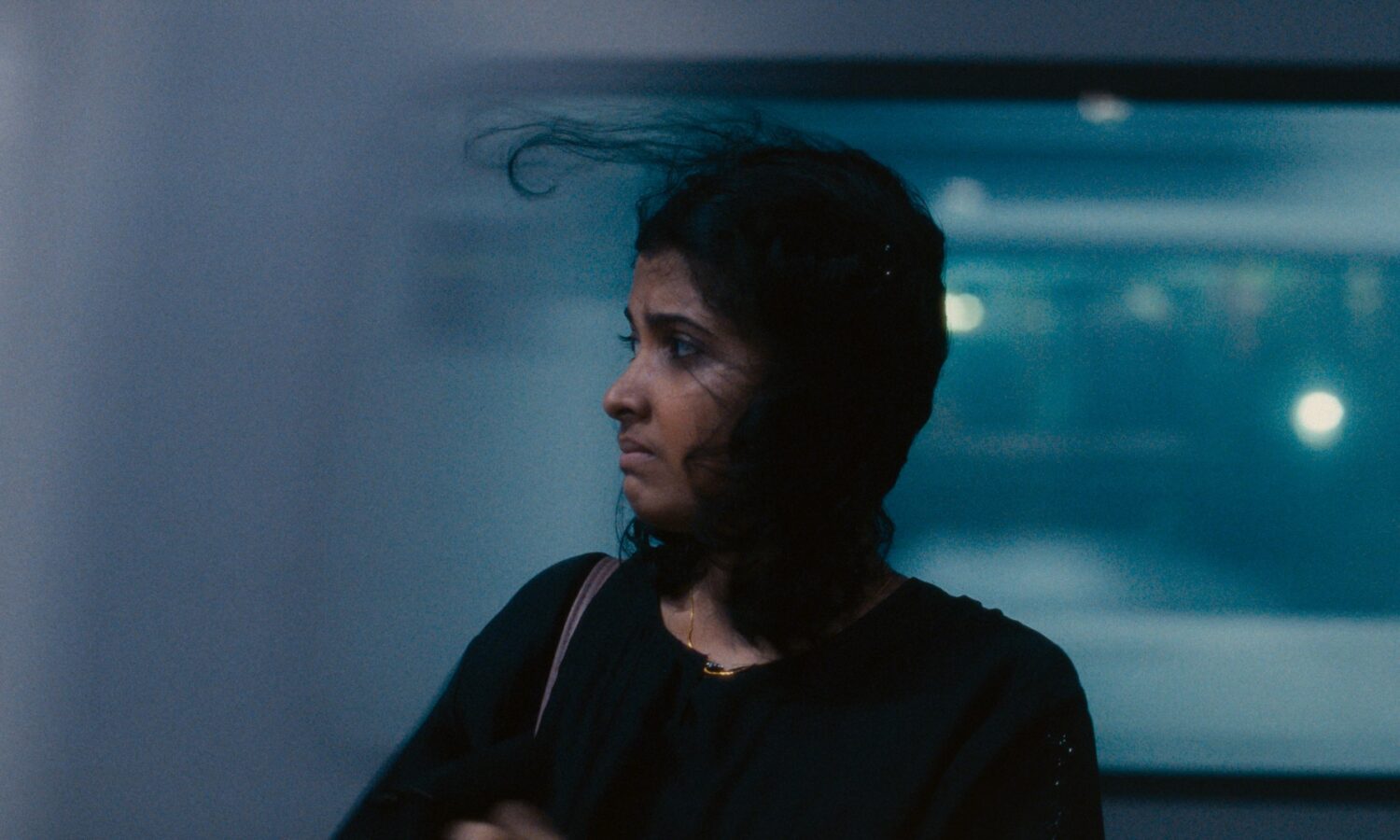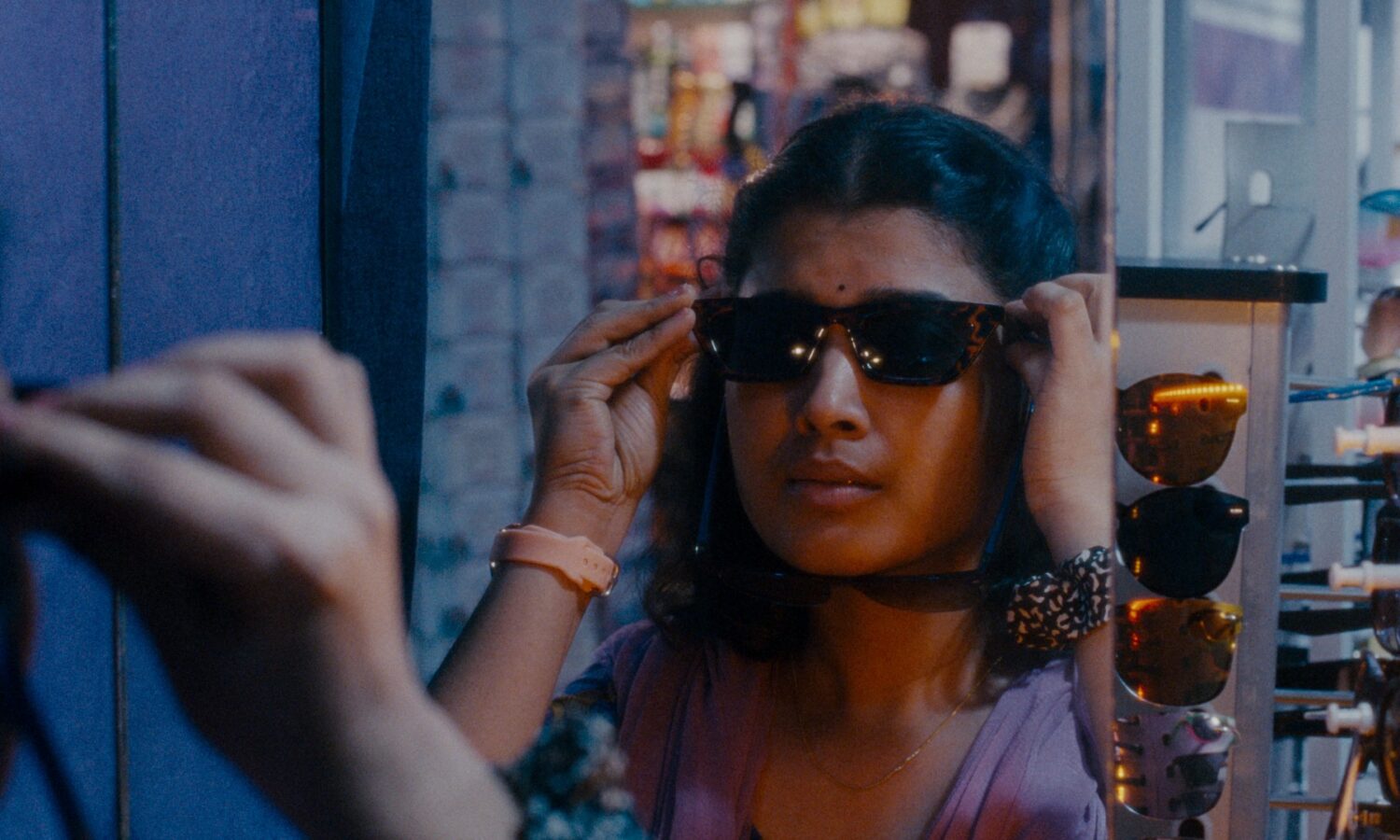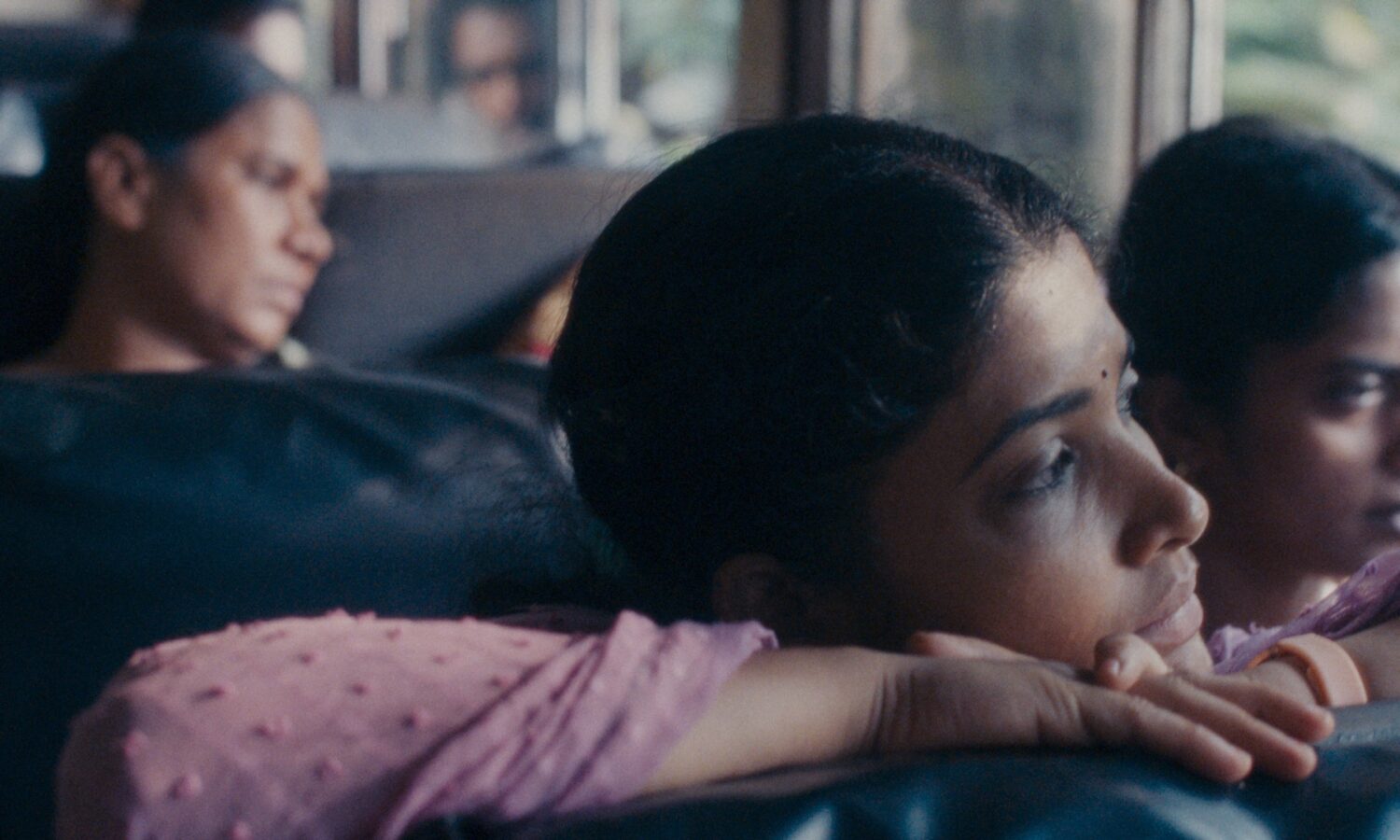‘All We Imagine As Light’: A Dazzling Ode to Beauty and Its Many Spectres
By Rida BilgramiAll We Imagine As Light is filled with moments of beauty: moonlight filtering through cobalt saris fluttering by the open window as two women whisper in bed; a transcendent act of lovemaking suffused in golden light; a static shot of a woman reading verses of Malayalam poetry penned by a hesitant lover lit by the glow of her phone screen while a glinting train saturates the nightscape behind her. Director Payal Kapadia and cinematographer Ranabir Das create a visual vocabulary of beauty not as spectacle nor indulgence but as a method of finding light in rupture and radiance in the quotidian.
The film, a Grand Prix winner at Cannes this year (the first film from an Indian director to gain entry into the main competition in over three decades), unfurls in two parts, chronicling the lives of three migrant women working in Mumbai, and following them over the course of one long day in a coastal town south of the city.

For almost two hours, the personal and the political coalesce in seamless and stunning ways, all in Kapadia’s vision. In All We Imagine As Light she traces the textures of women’s sexual, emotional, and political desires, exploring how these intersect with feminised conditions of labour; how they shift and morph into new forms as their world enlarges.
Prabha (Kani Kusruti) and Anu (Divya Prabha) are nurses from Kerala who work in a local hospital in Mumbai and share a modest accommodation. Prabha, a senior nurse, who had an arranged marriage with a man working in Germany cannot remember the last time they spoke to each other. Still, the knot of marital obligation is tightly bound even as Prabha’s loneliness and abandonment quietly smoulders the screen. There is potential for a romance with a sonographer at the hospital who writes poems and bakes sweets for her, but the possibility of acquiescing to her desires is terrifying. Her estranged husband’s only attempt at communication after many years manifests through a new rice cooker that arrives at her doorstep. In a poignant scene, an affection-starved Prabha kneels in the kitchen in the twilight hours to retrieve the rice cooker and clutches it tightly as though embracing a lover. The appliance is the only tangible connection she has left to a ghostly presence in her life.
Anu, the ebullient, younger nurse is more autonomous and carefree in her choices, pursuing a clandestine romance with Shiaz (Hridhu Haroon) while parental pressure to get married to a man of their choice looms over. Anu and Shiaz share a language but not faith. In a society riven by prejudice, an amorous relationship between a Hindu woman and a Muslim man, further endangered by their class, carries immense social stigma and, at worse, violent censure. Kapadia sets up a clever juxtaposition in the two women’s romantic fortunes: just as Prabha’s present is burdened by the apparition of the past, Anu’s future is shaded by the predicament of a star-crossed romance. Prabha is judgemental of Anu’s demeanour, privately reprimanding her after observing her flirting with one of their co-workers but also defends her when a gossiping co-worker criticises Anu’s character. Prabha’s instinct to protect Anu from salacious gossip and from the implied consequences of her interfaith relationship collide with her adherence to notions of respectability. One of the singular achievements of All We Imagine As Light is its nuanced portrayal of how internalised patriarchy dents female friendships. The two lead performers distil the complicated ambivalence of this dyad while also giving space to the relationship to shift over time to one of mutual support and sisterhood.

The third star in the constellation is Prabha’s close friend Parvati (Chhaya Kadam) who works in the hospital kitchen. Following her husband’s death, she is being evicted from her home of many decades by ruthless property developers to make way for high-rise apartments. Lacking documentation, Parvati cannot legally prove that the house she currently lives in belongs to her. “Class is a privilege reserved for the privileged,” boasts the tagline of the builders ready to demolish Parvati’s home.
In situating the characters in a hospital, Kapadia brings attention to labour that is not in a factory, a restaurant, a farm or the home. Labour that is both emotional and physical deeply committed to care and healing but the lives of those performing this labour are no less precarious and vulnerable.
The first half of All We Imagine as Light is set in Mumbai, a city that has been depicted in countless mainstream and independent films in India over the decades, from Raj Kapoor’s iconic Shree 420 set in 1950s Bombay to Mira Nair’s Dickensian Salaam Bombay and Ram Gopal Varma’s gritty crime drama Satya. However, Kapadia and Das reimagine the city in a way rarely seen on screen – as a site of alienation and impermanence. Mumbai becomes a patchwork of transitory spaces, such as the local trains and buses Prabha takes to commute to work, blurring lights of the city gliding past. Set in the monsoon season, the soundscape is enlivened by the constant patter of rain as much as it is by the delicate strains of the film’s score, in particular the recurring jazz piano interlude by late Ethiopian composer Emahoy Tsegué-Maryam Guèbrou. The Mumbai scenes play out largely at night and are bathed in tones of saturated blue as a reflection of how light is diffused during those months. The cool palette also evokes melancholy and detachedness which defines the social hierarchies that shape the city and govern people’s lives.
In the second half of the film, the women travel to the seaside town of Ratnagiri, a significant migrant hotspot that supplies workers to Mumbai, where Parvati is originally from. In contrast to kinetic Mumbai, the shores of Ratnagiri are tranquil. The blue iridescence of Mumbai fades into a soft amber blush and the light becomes more diaphanous. The gritty hustle of Mumbai shifts to something more magical in Ratnagiri. In a dreamlike sequence, Prabha and Anu happen upon the answers to their own yearnings. One of the capacious powers of cinema is to honour time by restoring it. Kapadia understands this, deftly playing with temporality in her work and exploring how a shifting notion of time shapes the characters’ relationship with place and each other. In a conversation at the New York Film Festival she expressed wanting to capture the contrast in how time collapses in Mumbai due to the pressures the city places on its inhabitants and how it stretches once the characters depart. Time in Mumbai is not leisurely for working class women. It’s only when Prabha and Anu leave behind the rigour of their daily lives that their inner worlds come into sharper focus. Time slows down and it becomes impossible to look away.

Kapadia’s adoption of hybrid forms and blurring the boundaries between fiction and non-fiction characterise her rich storytelling. Her previous work A Night of Knowing Nothing, a largely monochrome docufiction, merges hybrid forms of home video footage, staged scenes, CCTV footage and the director’s signature flourish – hand-drawn sketches projected onto moving images. What emerges is an impressionistic fever dream documenting India’s turn to authoritarianism and Hindu nationalism with a focus on oppositional student politics through the lens of personal longing and loss in an inter-caste relationship. Despite its international acclaim, A Night of Knowing Nothing was never released in India.
All We Imagine As Light may be less overt in its politics of dissent but has a similar oneiric quality and an astute eye for how contemporary India’s socio-political fabric is imprinted on each aspect of daily life, particularly that of its women. In a thrilling scene Parvati and Prabha throw rocks at a banner advertising the apartment blocks with glee and frustration. In Parvati’s eviction Kapadia effectively underlines the precarity and disenfranchisement of the lives of the working class from cities they’ve built and helped grow. The alienation of urban migration and the trade-offs it demands is poignantly captured in the characters leaving behind their families, learning a new language, struggling to adapt with no guarantee of success, their existence continually straddling two worlds. The film’s opening shot is documentary footage of Mumbai accompanied by an audio archive of testimonies by migrants to the ‘city of dreams’ in Gujarati, Bengali, Marathi and other Indian languages that set the thematic tone for the film – dislocation and alienation. “I’ve lived here 23 years, but I’m afraid to call it home,” one says. “The city takes time away from you,” says another.

Earlier this year I attended the Il Ritrovato film festival in Bologna focused on film restorations, where a recurring strand of programming Cinemalibero focused on cinema born on the margins, between the creases afflicting communities forgotten by those in power. Kapadia’s artistic practice is a vibrant example of this cinema of liberation, committed not simply to documenting acts of resistance, but to creating a new vernacular of filmmaking that reimagines social and gender relations that transcend patriarchy, refuse submission, and commit to care, kinship and solidarity. The characters she writes are not only untangling themselves from social scripts but also building new realities and possibilities. Kapadia’s vision and aesthetic also redefine beauty. Her images are rendered beautiful because they are sites of encounters and meaning – an idea that is very resonant with academic Christina Sharpe’s work on beauty as a method: “I’ve been thinking about what beauty as a method might mean or do: what it might break open, rupture, make possible and impossible. How we might carry beauty’s knowledge with us and make new worlds.”
The title, “All We Imagine as Light,” is obliquely explained in a voiceover about a factory worker so overworked that he could barely imagine how daylight looked. The final act brims with hope and reconciliation in a world that can feel dark, inhospitable and precarious. Perhaps flashes of illumination lie within embracing love in its plurality as a state of sublime grace: romantic love, a love for the bygone, the inanimate, love of a memory. Or a dream.
All We Imagine as Light releases in UK and Irish cinemas on 29 November 2024.
Rida Bilgrami is a writer based in London. Her work spans poetry, essays and reported features with a focus on travel, books, visual culture and cities. All photographs, including header image courtesy of BFI.